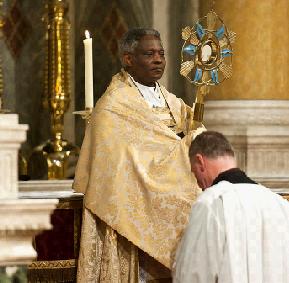
When 117 cardinal electors choose Pope Benedict XVI’s successor in the Conclave next month, their decision will have political ramifications. In addition to addressing controversial social issues and scandal, the next pope will be leading a much more geographically and culturally diverse faith than his predecessors.
In the past, the office of pope has been held almost exclusively by Italians, but in recent history popes have been from other European nations. However, the geographic shift of Catholicism away from Europe and North America brings the possibility of a pope from Latin America, Africa, or Asia.
Yet over half of the cardinal electors are European, and many are Italian, compared to the one sixth of cardinal electors hailing from Latin America, for example. In addition, proficiency in Italian and familiarity with Europe are considered prerequisites. These aspects of the papal election skew in favor of European cardinals.
Papal candidates do not campaign, but some cardinals are generally considered to be contenders before the Conclave. As many social and political issues continue to challenge the church, each prospective candidate carries with him certain political ramifications influenced by his background within the church and the region of the world from which he comes.
Within Europe, Cardinal Angelo Scola, the conservative Archbishop of Milan, has experience directing a large diocese, dealing with local affairs, and would continue the conservative theology of Pope Benedict XVI.
Cardinal Schönborn, from the present Czech Republic, now serves as the archbishop of Vienna. His candidacy may be bolstered by his role overseeing the church’s response of the pedophilia scandals in Austria, in addition to being intellectually conservative.
Outside of Europe, possible candidates include Cardinal Odilo Scherer, the archbishop of San Paulo, Brazil. Though serving in Brazil, he is half German, has been educated in Europe and has worked in the Vatican. A pope from Latin America, where live 1.2 billion Catholics, could signal a shift in attention towards social issues and poverty.
From Africa, Peter Turkson is the first Ghanian cardinal and the relator, or general secretary, for the Synod of Africa. He is seen as theologically moderate, having signaled openness to the idea of allowing the use of condoms for couples with HIV.
The youngest potential candidate is Luis Tagle from the Phillipines. He is the archbishop of the capital, Manilla, where live 2.8 million Catholics. Only recently made a cardinal, Cardinal Tagle is known for being a man of the people, riding rickety bicycles to visit friends and inviting beggars in to share meals. He also is more capable of using media outlets, including Facebook and local television.
With North America too comes a distinct set of political issues, including abortion, homosexuality, and euthanasia to end suffering. Cardinal Dolan, the archbishop of New York has been mentioned as a contender, but cardinal electors are often hesitant to promote figures from a world superpower.
Though cardinals from outside Europe have been raised as possible candidates, bringing to light political issues that the Vatican must address, the church may not be ready to have a pope from Africa soon.
Cardinal Theodore McCarrick, former archbishop of Washington, told John Allen Jr. in an interview for the National Catholic Reporter that while the church is already outside the First World, he did not know whether the cardinals would vote outside Europe.
“Were they ready for a Latin American last time?” McCarrick asked. “Well, apparently not.”
As he leads the church, he will need to respond to challenges from different social, economic, and cultural regions of the world to a greater extent than his predecessors. In doing so, he will be informed by and affect the world with the experience and emphasis of his culture.
The cardinal electors’ decision this March will indicate the direction the church’s leaders see as most important. The geographical shift of Catholicism, diversity of issues important to the church across regions, and traditional structure of the Conclave will affect their decision and signal intention for the future of the church.

